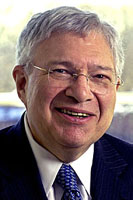| Sun | Mon | Tue | Wed | Thu | Fri | Sat |
|---|---|---|---|---|---|---|
| 1 | 2 | 3 | 4 | 5 | ||
| 6 | 7 | 8 | 9 | 10 | 11 | 12 |
| 13 | 14 | 15 | 16 | 17 | 18 | 19 |
| 20 | 21 | 22 | 23 | 24 | 25 | 26 |
| 27 | 28 | 29 | 30 | 31 |
CATEGORIES
RECENT ENTRIES
BLOG ROLL
Transplant ethics

|
In 1905 U of C physiologist Alexis Carrel, after successfully stitching together blood vessels, reattaching severed limbs, and transplanting organs in dogs, declared that "the problem of organ transplantation in man has been solved." Although Carrel's work in Hull Court broke new ground and won him a 1912 Nobel Prize, his prematurely conclusive statement was "so Chicago," quipped professor Mark Siegler, MD'67, in Tuesday's Ryerson lecture. Scientists didn't yet understand immunology, and another 40 years would pass before the first partial-kidney transplant was performed on a person. That's when David Hume, MD'43, took a kidney from a newly dead patient and attached it to the arm of a sick woman. Hume and his team watched the woman's urine drip into the correct tube. Although the organ worked for only a few days, Siegler said, it was enough for her own kidneys to begin to heal.
Siegler, the Lindy Bergman distinguished service professor in medicine and surgery and founding director of the MacLean Center for Clinical Medical Ethics, outlined these early achievements and more contemporary ones during his lecture at Max Palevsky Theater. Chosen by fellow faculty members to give the annual talk, Siegler noted that he'd heard 30 of the past 33 Ryerson lectures, including the 1974 inaugural speech by John Hope Franklin. His attendance record, he joked, might have been a factor in his selection.
He focused on organ transplantation not only because of Chicago's contributions but also because "we encounter every ethical issue in transplants." For Siegler, who coined the term "clinical medical ethics," such issues remain paramount. The two main ethical challenges for transplants, he said, are increasing the organ supply and distributing them equitably. One current solution to the organ-shortage problem is a Chicago-based proposal for paired-kidney exchange: if a living donor is a bad match for a relative, the two could find another donor-recipient pair to match with, thus increasing the organ supply. While some argue this exchange might violate federal law, this month, reported Siegler, the U.S. House and Senate both passed a bill to amend the 1984 National Organ Transplant Act and legalize the practice.
Before taking questions Siegler touched on other ethical issues of the day, including paying for organs and a joint Chicago-China program to improve that country's transplant policies. In China 1.5 million people need organs, mostly livers because of a hepatitis B epidemic, but only 10,000 transplants are performed each year. And most of those organs, Sielger said, are taken from executed prisoners. The joint program, he and the principal investigators hope, will help bring China's program up to ethical standards.
A.B.P.
Photo: Mark Siegler gave Tuesday's Ryerson lecture.
April 25, 2007
